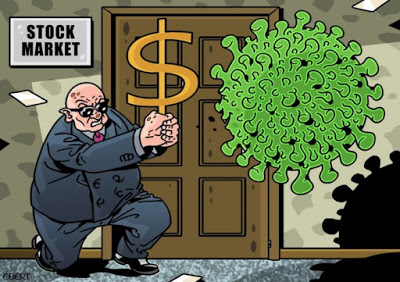The Capitalist Pandemic, Coronavirus and the Economic Crisis
 |
| Éric Toussaint 22/03/2020 |
Part 1
Tradotto da Sushovan Dhar সুশোভন ধর – Christine Pagnoulle
Summary
A public health crisis
The coronavirus pandemic is a serious public health problem and the human suffering caused by the spread of this virus will be enormous. If it massively affects countries of the Global South with very fragile public health systems that have been undermined by 40 years of neo-liberal policies, the death toll will be very high. We must not forget the critical situation of the Iranian population, victim of the blockade imposed by Washington, a blockade that includes medicines and medical equipment.
Under the pretext of necessary fiscal austerity to repay public debt, governments and major multilateral institutions such as the World Bank, the IMF and regional banks such as the African Development Bank have everywhere enforced policies that have deteriorated public health systems: job cuts in the health sector, precarious employment contracts, reduction of hospital beds, closure of local health centres, increase of health care costs and of prices of medicines, under-investment in infrastructure and equipment, privatization of various health sectors, under-investment by the public sector in research and development of treatments for the benefit of the interests of large private pharmaceutical groups…
This is true in Africa, Asia, Latin America and the Caribbean and in the countries of the former Eastern bloc (Russia and other former republics of the former USSR, Central and Eastern Europe).
Nevertheless, this obviously also concerns European countries such as Italy, France or Greece. Moreover, in the United States, where 89 million people have no real health coverage, which Bernie Sanders sharply indicts, what will happen?
The mainstream media and governments focus on the differences in mortality rates according to age, but they very carefully avoid any reference to class differences and how mortality, due to the coronavirus pandemic, will affect human beings according to their income and wealth, and therefore, to the social class to which they belong. Quarantine and access to intensive care for people who are 70+ are very different whether you are rich or poor.
There will also be a divide between the countries that have, despite neoliberal policies, maintained their public health systems better than others and those that have gone furthest in undermining the quality of public health services.


